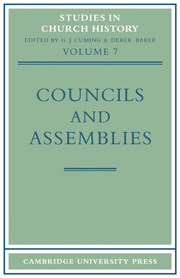Book contents
- Frontmatter
- Preface
- Contents
- Contributors
- Abbreviations
- Public welfare and social legislation in the early medieval councils (Presidential Address)
- National synods, kingship as office, and royal anointing: an early medieval syndrome
- The case of Berengar of Tours
- Ecclesiastica and Regalia: Papal investiture policy from the Council of Guastalla to the First Lateran Council, 1106–23
- Viri religiosi and the York election dispute
- Councils and synods in thirteenth-century Castile and Aragon
- The Byzantine reaction to the Second Council of Lyons, 1274
- The Council of London of 1342
- Education in English ecclesiastical legislation of the later Middle Ages
- The representation of the universitas fidelium in the councils of the conciliar period
- Nicholas Ryssheton and the Council of Pisa, 1409
- The condemnation of John Wyclif at the Council of Constance
- Some aspects of English representation at the Council of Basle
- The Council of Basle and the Second Vatican Council
- The Colloquies between Catholics and Protestants, 1539–41
- King James I's call for an ecumenical council
- John Hales and the Synod of Dort
- Assembly and Association in Dissent, 1689–1831
- The Convocation of 1710: an Anglican attempt at counter-revolution
- Laymen in synod: an aspect of the beginnings of synodical government in South Africa
- The First Vatican Council
- Kikuyu and Edinburgh: the interaction of attitudes to two conferences
Nicholas Ryssheton and the Council of Pisa, 1409
Published online by Cambridge University Press: 12 March 2010
- Frontmatter
- Preface
- Contents
- Contributors
- Abbreviations
- Public welfare and social legislation in the early medieval councils (Presidential Address)
- National synods, kingship as office, and royal anointing: an early medieval syndrome
- The case of Berengar of Tours
- Ecclesiastica and Regalia: Papal investiture policy from the Council of Guastalla to the First Lateran Council, 1106–23
- Viri religiosi and the York election dispute
- Councils and synods in thirteenth-century Castile and Aragon
- The Byzantine reaction to the Second Council of Lyons, 1274
- The Council of London of 1342
- Education in English ecclesiastical legislation of the later Middle Ages
- The representation of the universitas fidelium in the councils of the conciliar period
- Nicholas Ryssheton and the Council of Pisa, 1409
- The condemnation of John Wyclif at the Council of Constance
- Some aspects of English representation at the Council of Basle
- The Council of Basle and the Second Vatican Council
- The Colloquies between Catholics and Protestants, 1539–41
- King James I's call for an ecumenical council
- John Hales and the Synod of Dort
- Assembly and Association in Dissent, 1689–1831
- The Convocation of 1710: an Anglican attempt at counter-revolution
- Laymen in synod: an aspect of the beginnings of synodical government in South Africa
- The First Vatican Council
- Kikuyu and Edinburgh: the interaction of attitudes to two conferences
Summary
In November 1408 Henry IV finally decided that England would support the Council of Pisa, called by the cardinals in defiance of the rival popes in the Great Schism. The decision seems to have met little opposition, but it must have involved at least some readjustment of ideas for Englishmen. There were of course good traditional arguments in favour of the Council, and we know now that the Government had not always taken a rigidly pro-Roman stand in moves to end the Schism, but Henry's English ecclesiastical contemporaries at least had been used to a policy which supported the Roman pope and which insisted that if a Council were called, only their pope (Gregory XII) could call it. In accepting Pisa they were accepting a Council which would proceed whether or not he supported it, and a policy knowingly designed to secure his removal, with or without his consent. How did they justify their action?
We know how the King justified himself (or rather we know what he said officially). He referred to information contained in the speech on behalf of the dissident cardinals delivered before him on 28 and 29 October 1408 by Cardinal Uguccione. In particular Henry insisted that Gregory had broken the oath he had made in the conclave and renewed at his coronation in 1406. Evidence and argument about this had formed a large part of Uguccione's case. Officially, therefore, the English thought Gregory at least suspect if not guilty of perjury, and of deliberately prolonging the Schism.
- Type
- Chapter
- Information
- Councils and Assemblies , pp. 197 - 208Publisher: Cambridge University PressPrint publication year: 1970



